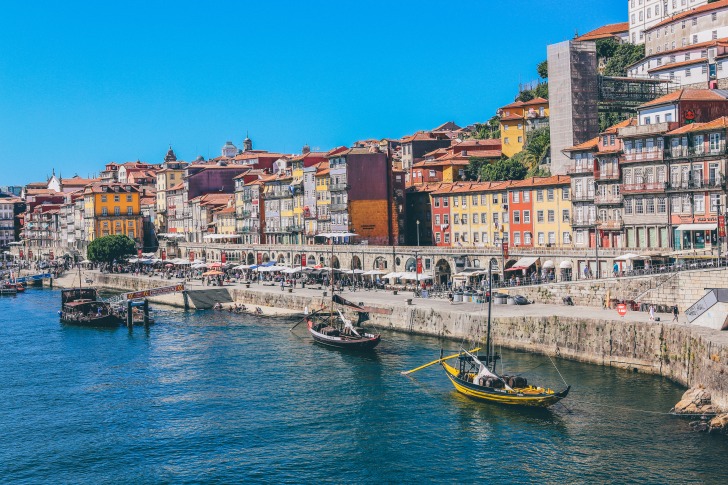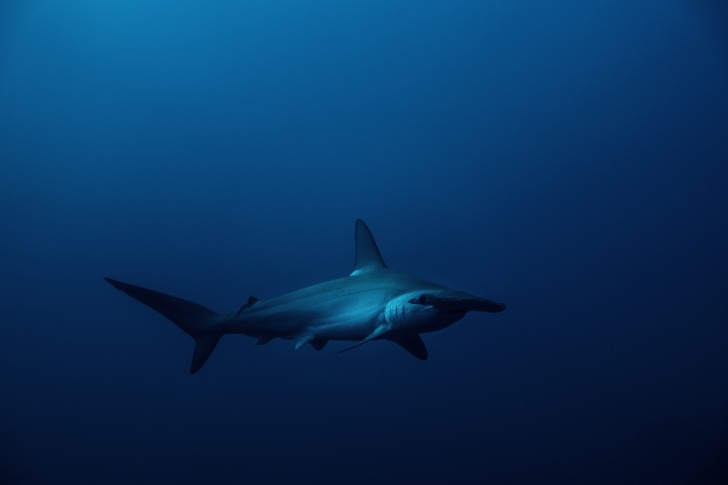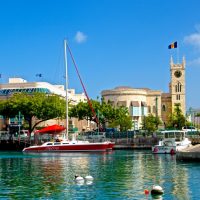Portugal is known to have many wonderful sightseeing activities for everyone to explore, such as popular beach destinations, zip-lining, kayaking, sky diving and so much more.
The weather is always sunny, the locals are always friendly and welcoming, and the cuisine is amazing.
Portugal’s waters are home to many sea animals, like cetaceans, fish, sea turtles, and many other deep sea creatures.
There are also some very dangerous animals lurking just beneath the surface of the ocean, on the coast of Portugal, that swimmers and visitors need to be aware of.
Contents
So… Are There Sharks in Portugal?
Portugal is located on the Iberian Peninsula of southwest Europe.
The ocean that washes Portugal is the Atlantic Ocean.
The water temperature in Portugal ranges between 78°F and 59°F.
So the question is whether there are sharks in Portugal.
The short answer is yes.
There are probably more sharks in Portugal than you think.
But, sightings are rare, and there have been no fatal attacks in the southwest European country to date.
In fact, there are over 200 shark species in the waters around Portugal.
There have been great white shark sightings in recent times.
It is believed that this is due to the warming temperatures caused by climate change.
These sharks are finding their way into new territory.
Young great white sharks normally swim closer to the coastline to feed, while adults remain deeper off the coast.
But these young great white sharks seem to be venturing into territories that were previously considered to be too cold.
There have been several sightings of hammerhead sharks in the Algrave.
However, these sightings were also attributed to the water temperature.
Most of the sharks that are found close to the shore in Portugal are harmless to humans and feed off other smaller fish, plankton, and crustaceans.
There are, however, some sharks that are considered to be very aggressive and dangerous to humans.
Summer is usually warmer in the Portuguese coastal waters and attracts various shark species as the water is closer to the ideal temperature for sharks.

One of the species you might find in the North Atlantic Ocean is the Great White Shark.
But, chances of encountering one of these beasts close to the shore in Portugal is rare, because they prefer the deeper waters of the Atlantic.
If you take a boat trip further afield in the Atlantic, your chances of seeing a Great White might improve, but it will still be rare.
One of the most common shark species that you may find in the water around Portugal is the Blue Shark.
These sharks typically inhabit the eastern Atlantic Ocean.
They are often caught up in fishing nets off the coast of Portugal.
These sharks prefer the deeper parts of the Atlantic but have been known to venture closer to the shore, especially in Portugal.
They are easily identified by their blue hue and normally grow to around eight feet in length.
While their diet mainly consists of fish, octopi, and crustaceans, they are still considered to be dangerous to humans and have been attacked in cases of mistaken identity.
A common shark in these waters is the Shortfin Mako Shark.
These sharks have been notably fished in Spain and Portugal.
They can grow to about ten feet in length and 300 pounds in weight.
They are not really considered to be dangerous to humans as there have been very few attacks on humans over the last few centuries.
The Basking Shark, a slow-moving, migratory shark, is known to swim in the waters of the Atlantic Ocean as well.
They are completely harmless to humans and are present in the coastal waters of Portugal.
They are the second-largest shark species and the largest shark species off the coast of Portugal.
The Smooth Hammerhead Shark prefers the warmer waters of the Atlantic.
They are present in Portugal and are considered to be dangerous to humans.
They are easily identified by their unique shape and can grow to nearly 12 feet in length.
Avoid any body of water when you spot these Apex predators.
The Common Thresher is found in the Atlantic Ocean bordering Portugal.
They are migratory fish that pose minimal threat to humans.
These sharks can grow to 19 feet in length.
These sharks are mostly shy and will swim away when they spot divers. It’s difficult to get close to one.
Another common fish in these waters is the Spiny Dogfish Shark.
They are completely harmless to humans and tend to either live close to the shore in shallow waters or deeper out at sea.
These small sharks grow to four feet in length and can be found all along the Portuguese coastline.
Their diet consists of small marine life like fish, crustaceans, shrimp, and jellyfish.
Is it Safe to Swim in Portugal?
It is generally safe to swim in the ocean and certain rivers in Portugal.
Sharks don’t seem to pose any real threat and there have been no deadly shark attacks in these waters.
However, swimmers are advised to take reasonable caution when swimming here.
Firstly, you must adhere to the rules.
That means only swimming in designated areas at designated times, where there are flags and lifeguards.
There are some strong rip currents in the water to be cognizant of.
Knowing how to identify and avoid a rip current is important.
Drowning is a real possibility in water where there is a strong tide or rips current.
Swimmers should avoid beaches that seem too empty or do not have active lifeguards on duty.
Cliff erosion is a problem in Portugal, but there are advisory boards placed around troublesome areas that warn visitors not to get too close to the edge.
The same is true about the body of water below these dangerous cliff areas.
When going to swim in the waters in Portugal, swimmers are advised to take reasonable caution and be aware of their surroundings in the water.
Interesting Shark Facts in Portugal
Here are a few fun facts about the sharks that swim in the Atlantic Ocean on the coast of Portugal.
Portugal is rated in the third position for most shark catches in the EU Member States.
The Food and Agriculture Organization (FAO) rates Portugal 16th in the world for shark catches.
Furthermore, the International Union for Conservation of Nature (IUCN) has listed several deepwater shark species, including the Portuguese Dogfish Shark, as either endangered or critically endangered.
Most European countries that border the ocean have banned shark finning.
This is the practice of catching sharks, removing their fins, and throwing their bodies back into the ocean.
Portugal and Spain are the only two countries that still issue permits to fishermen that allow this.
Most sharks live in salt water.
There are exceptions, like the bull shark, which has adapted to fresh water but predominantly lives in salt water.
There are freshwater sharks that only live in freshwater and do not venture into salt water.
These sharks have adapted to living in freshwater by evolving.
Saltwater makes sharks more buoyant in saltwater.
Research suggests that most sharks are less buoyant in freshwater if they have not adapted to swimming in freshwater.
Most bony fish have gas-filled swim bladders that help them stay afloat in salt water.
However, sharks have oil-filled livers that help them stay afloat.
Sharks must retain the salt in their bodies and are often saltier than the water they swim in.
Without the salt, their cells would rapture, would start to bloat, and would eventually die.
The sharks that have adapted to living in freshwater or at least being able to swim in freshwater, like the Bull Shark, also have special gills and kidney functions to help with the reduced amount of salt in the water.

3 Safety Tips for Swiming in Shark-infested Waters
- Do not enter shark-infested waters. It is quite obvious to not swim in waters that are known to be inhabited by many shark species. Even if a shark is not provoked by a human, it may be curious and want to investigate, which could lead to an accidental attack. Therefore, it’s suggested to rather look for a safer destination to swim in.
- Avoid wandering off too far from shore. The water could pull you in if you go too deep and it may be difficult for you to make your way back to shore. There are certainly sharks and many other sea animals present within just the shallow part of the ocean, which is why you should always keep an eye open for them at all times. Immediately, swimming back if you notice you are too far out, could save your life.
- Make use of the “buddy system”. The chances of a shark attacking when you are in a group of two or more people are less likely than if you were to be alone. Sharks are more probable to attack an individual.
Summary
There are sharks in the water around Portugal.
Many of the sharks that venture closer to the beach are relatively harmless.
Shark sightings are also fairly rare.
But this does not mean that there aren’t any dangerous sharks in the water around Portugal.
There have been very few shark attacks on record in the country and no fatal attacks.
However, swimmers are still advised to practice reasonable caution as there are other dangers that lurk in the water around the coastal areas of Portugal.
For the most part, visitors should enjoy the beautiful beaches as the most serious threat seems to be strong rip currents and tides.
Portugal Safety Overview
READ THE FULL REPORT: Portugal Safety Review
Safety Index:
- OVERALL RISK: LOW
- TRANSPORT & TAXIS RISK: LOW
- PICKPOCKETS RISK: LOW
- NATURAL DISASTERS RISK: LOW
- MUGGING RISK: LOW
- TERRORISM RISK: LOW
- SCAMS RISK: MEDIUM
- WOMEN TRAVELERS RISK: LOW
Frequently Asked Questions
How many people die every year from shark attacks?
There have been only three recorded shark attacks in Portugal’s history, but the probability of being attacked is almost non-existent.
That being said, sightings of any sharks are also extremely rare.
Are sharks dangerous to humans?
While sharks are known to be an aggressive species, almost every kind of shark species could attack you if provoked.
Sharks aren’t necessarily unfriendly, but it’s better to be safe than sorry if you aren’t experienced with wildlife animals.
You should always be aware and cautious of your surroundings and do the proper research before deciding to swim at a certain location.
What is the most likely reason a shark would attack?
It is important for you to know that sharks could easily eat you if they really wanted to, but they often don’t because they would much rather feed on fish or marine animals.
That’s because humans aren’t on their normal diet.
When fish or prey is nearby, sharks can often mistake humans for prey and even competition in some cases.
They would likely only attack if they are defending themselves because they feel threatened, provoked, or curious.












While there are sharks in the waters, the chances of encountering one are rare and attacks are even rarer.